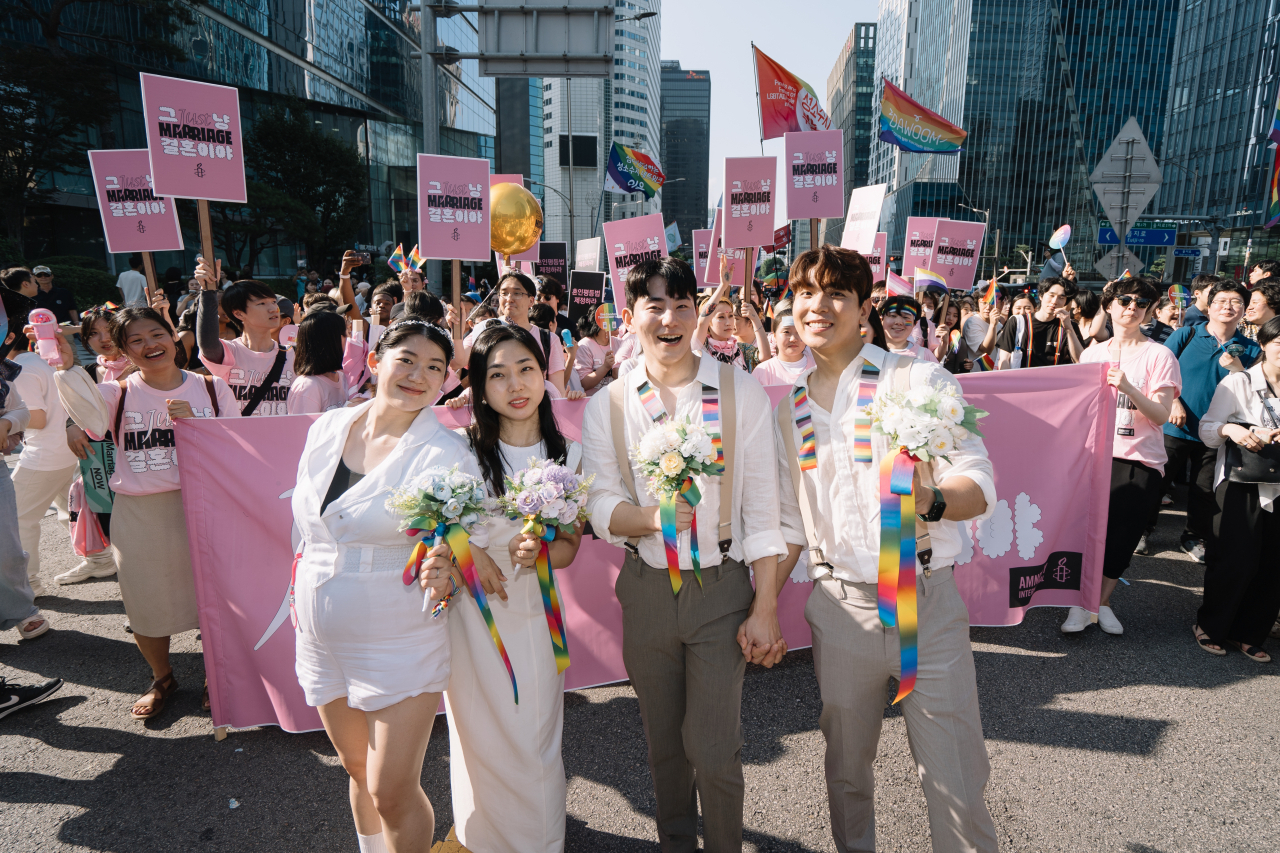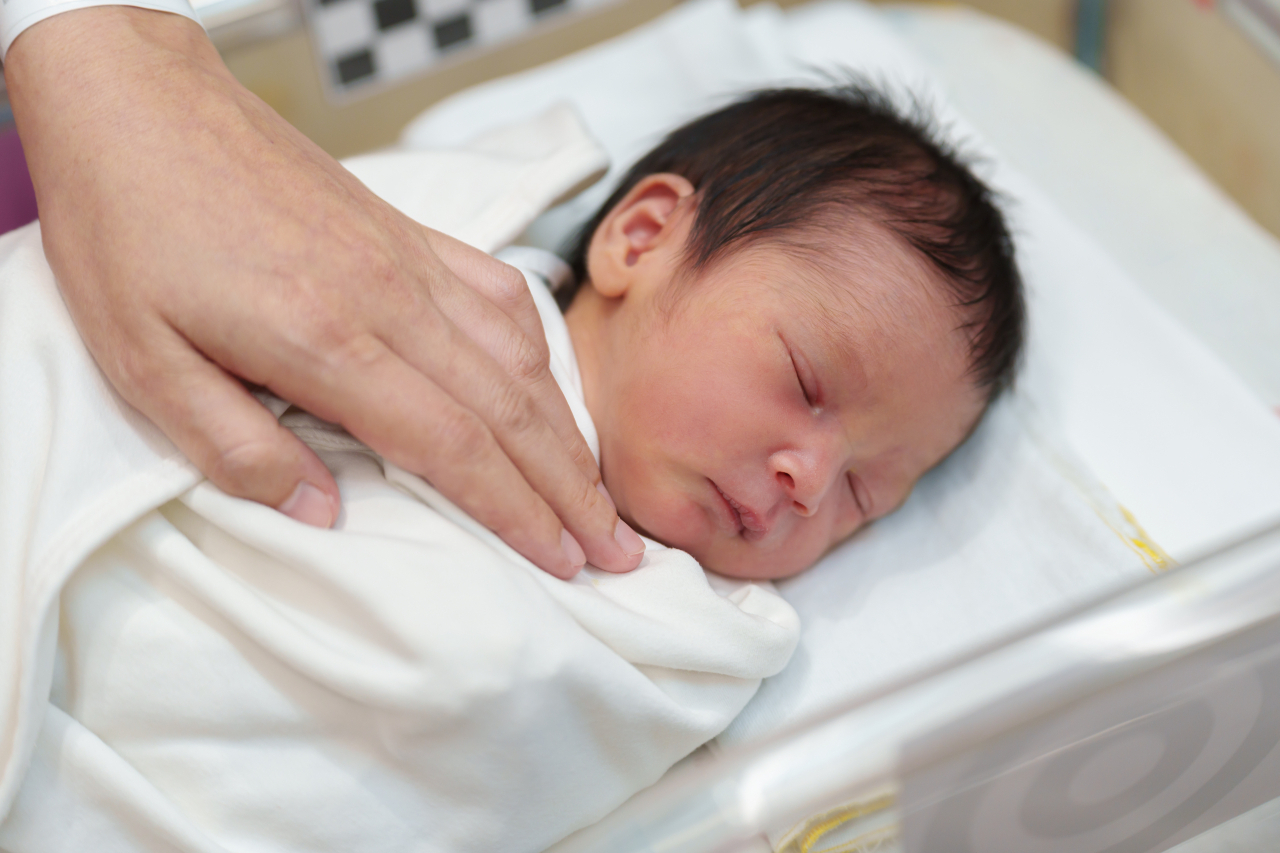Why it's so hard for same-sex couples and single women to have kids in S. Korea
First lesbian couple expecting baby had to travel overseas for sperm donation as Korea restricts women without a husband from accessing assisted reproductive technology
By Yoon Min-sikPublished : July 10, 2023 - 13:31
Kim Gyu-jin and Kim Se-yeon held their wedding ceremony during the 2023 Seoul Queer Culture Festival earlier this month in central Seoul. Hundreds at the festival congratulated the wife-wife couple on their union -- even though it is not legally recognized by South Korean law -- as well as on the baby they are expecting.
The Kim couple revealed that their quest to have a child required a trip to a foreign country, Belgium, as accessing a sperm donor had not been possible for them in South Korea.
In addition to same-sex couples, single women also face significant obstacles here when it comes to accessing sperm donations, largely due to a combination of legal restrictions and customary practices within the medical community.

No husband, no sperm?
Three years ago, Japan-born TV personality Fujita Sayuri became a mother through intrauterine insemination (IUI) via sperm donation.
Though she'd lived in South Korea for most of her adult life, she had to move back to Japan for the pregnancy, because sperm donation was “illegal” for someone like her lacking a legal husband, she said. She is now back in Korea, raising her son here.
Her story raised questions about whether the South Korean system needs to adapt to changing concepts of family, as more people are choosing not to marry, but still want to start a family of their own with the help of science.
In South Korea’s Bioethics and Safety Act, Article 24 -- which deals with consent concerning producing embryos -- states that the medical institution shall obtain the written consent of the donor and the spouses of both the donor and the person undergoing in vitro fertilization when extracting the sperm or eggs, provided the donor has a spouse.
The clause was revised to its current version in the mid-2000s after high-profile stem cell researcher Hwang Woo-suk was found to have fabricated a series of stem cell experiments, during which his female subordinates were pressured to donate eggs for research.
Amid the controversy that followed, the Ministry of Health and Welfare issued a statement that, contrary to Fujita’s understanding, it is technically not illegal for a woman without a husband to be inseminated with donated sperm.
The clause mandates a spouse’s consent only if the donor has one, the ministry explained, and does not require spousal consent from an unmarried person.
The reality, however, is that it is still impossible to find a doctor who would perform the procedure on a single -- at least by legal standards -- woman.
An ethical guideline set by the Korean Society of Obstetrics and Gynecology tells its over 4,500 members to conduct assisted reproductive procedures, including IUI and IVF, on legally married couples only, or those in common-law marriages.
Last year, the National Human Rights Commission of Korea recommended that the group revise the guideline.
Appearing before lawmakers at the National Assembly last October, KSOG chief Park Joong-shin said that the guideline stems from potential legal complications that could arise from assisted pregnancies, not doctors’ opposing the prospect of unconventional families.
“We reviewed the case after the human rights commission’s recommendation, but we were unable to revise the guideline, because the law is based on the definition of subfertility within a married couple,” he said, adding that assisted reproduction technology is considered a "subfertility" treatment in South Korea.
He was referring to subsection 11 of Article 2 in the Mother and Child Health Act, which states that the term subfertility refers to "a state in which a woman is unable to conceive even after one year has elapsed though the couple has a normal sex life in a state in which they do not use birth control.”
The official English translation provided by the Korean Law Information Center has a "woman," instead of a "married couple," being unable to conceive, leaving out the part about having the status of being in a marriage or common-law marriage.
The same act provides the legal grounds for providing government subsidies for assisted reproductive technology treatment to married couples or those in common-law marriages, but excluding single women.

Finding donors
Even if there was a clinic willing to help women seeking to have a baby but who do not have legal married status, there remains another hurdle – where to get the sperm.
The Bioethics Act bans anyone from profiting from sperm donation. Access to publicly donated sperm is limited to those who are entitled to receiving the government’s subfertility subsidies.
This situation has ailed the Kims: both being Korean, the lesbian couple first considered conceiving with a sperm donation here. But they gave up when they saw single friends’ requests to get IVF rejected by local clinics that operate their own small banks of donated sperm. There is no state-run public sperm bank in Korea.
“Korean hospitals only provide sperm for those legally married or in common-law marriages, which rules us out. Since we cannot afford to otherwise pay for a sperm donation, the only option left was to ask one of our friends (to donate his sperm to us), which was not easy,” Kim Gyu-jin said in a recent interview with local media. So they decided to fly to Belgium.
As in most countries, the traditional concept of a heterosexual nuclear family consisting of a father, a mother and one to two children is rapidly changing. Some people choose to opt out of having kids, while others don't want a heterosexual partner. Some don't want to marry at all.
A 2021 Realmeter survey of 1,000 adults across the country showed that 57 percent of respondents supported childbirth outside of marriage, while 43 percent were against it. About 67 percent of women and 53 percent of men said it was “okay either way” whether they got married or not.
On why they supported pregnancy outside of marriage, 66 percent said “personal choices should be respected,” while 48 percent said “one should not have to get married to have children.”
With public opinion shifting amid the world’s lowest birth rate, South Korea appears to be inching toward a more open-minded approach to women and childbirth.



















